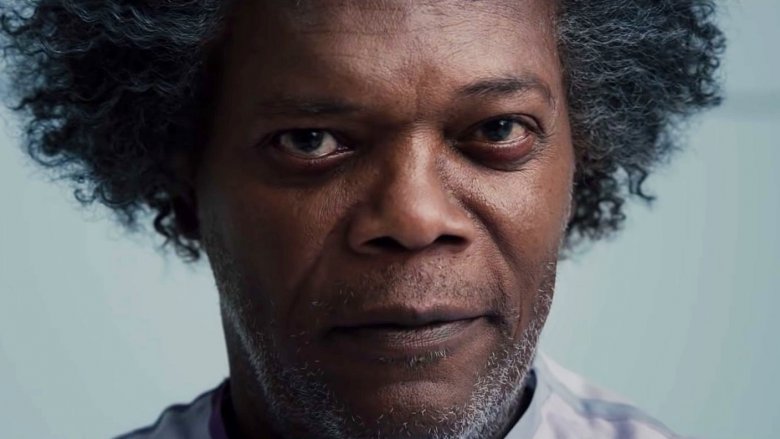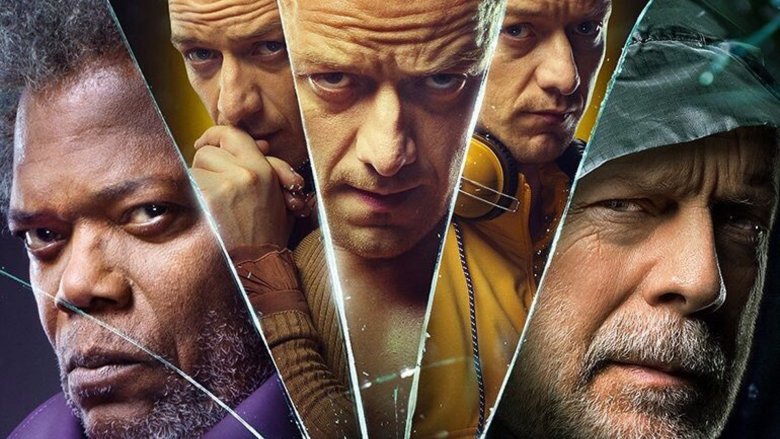What Critics Are Saying About Glass
Ever since director M. Night Shyamalan announced his forthcoming film Glass, a sequel to his 2000 feature Unbreakable and his 2017 hit Split, several questions have plagued fans' brains: Would it be as great as everyone hoped? And moreover, would it live up to its predecessors, both of which were largely adored? Would Glass crackle across the silver screen in spectacular fashion and kick-start a fantastic year in film, or would it be so frightfully frosted that viewers wouldn't be able to see any good in it?
Well, the reviews for Glass are officially in, and the answers to those questions might break your heart.
Critics are calling the film — which brings together the indestructible hero David Dunn (Bruce Willis), the brittle-boned comic book theorist and wannabe super-villain Elijah Price/Mr. Glass (Samuel L. Jackson), and the 24 distinct and sometimes dangerous personalities of Kevin Wendell Crumb (James McAvoy) and places them in a psychiatric facility under the care of Dr. Ellie Staple (Sarah Paulson) — a massive disappointment and one of the worst of Shyamalan's entire career. (And that's a bold statement, considering he's, you know, the guy who made that god-awful Avatar: The Last Airbender film that very few people actually enjoyed.)
Here's a round-up of what critics are saying about Glass.
IndieWire senior film critic David Ehrlich wrote that Shyamalan's Glass is "biggest disappointment of his career," also arguing that it's dull, joyless, and will probably come across as completely incoherent to those not familiar with Unbreakable and Split.
"A low-budget, high-concept superhero movie that's as clever in its design as it is joyless in its execution, M. Night Shyamalan's Glass is meant to be seen as some kind of demented self-portrait, but which of its dull characters is the long-suffering auteur meant to be?" Ehrlich's review opens. "The trouble with Glass isn't that its creator sees his own reflection at every turn, or that he goes so far out of his way to contort the film into a clear parable for the many stages of his turbulent career; the trouble with Glass is that its mildly intriguing meta-textual narrative is so much richer and more compelling than the asinine story that Shyamalan tells on its surface."
He added, "This was supposed to be Shyamalan's greatest triumph — the coup de grâce of the long comeback saga that he's been living for most of the 21st century ... Glass is poised to be the film that silences the doubters once and for all, and permanently re-establishes Shyamalan as a major creative force. Instead, this lugubrious slog only sharpens the feeling that he's too raw and reactionary for his own good — that he's grown too invested in his own story to tell any others with the patience, discipline, and power that defined his first hits."
Variety's Owen Gleiberman also felt that Glass was a let-down, despite it proving that Shyamalan is still a "poised and confident filmmaker who seizes our attention." Describing the film as "stripped of any sense of revelation" and "more busy than it is stirring or exciting," Gleiberman wrote, "The movie, watchable as it is, is still a disappointment, because it extends and belabors the conceits of Unbreakable without the sensation of mystical dark discovery that made that film indelible. Glass is a sequel that feels more dutiful than necessary. It turns the earlier film's ominous pop poetry into overexplicit blockbuster prose."
Angie Han of Mashable offered one of the more colorful reviews of Glass, painting in choice words the film-watching experience: "Watching Glass is like going to the movies with that one friend who cannot help leaning over to whisper one banal observation after another into your ear, and then leaning back satisfied that he's just blown your mind."
She went on to write, "Where Unbreakable was meticulous, re-examining well-worn tropes through well-drawn characters, Glass is uncontrolled. It doesn't so much analyze or update those tropes as it does lampshade them, and call it a day ... It'd be easier to tolerate the smug self-referentiality if Glass had anything much else to offer ... Instead, Glass spends roughly half its running time re-establishing the basic premise of these movies (essentially, 'What if superheroes were real?') through a new character so insubstantial, I couldn't tell if she was supposed to be mysterious or just dull ... It's a superhero movie that seems to believe it's cleverer than other superhero movies because it calls out the genre's staples, but in doing so reveals only that it has no real insight into what makes superheroes click — either the characters themselves, or the genre they comprise."
ScreenCrush's Matt Singer felt that Glass could have been something worthwhile if Shyamalan had done with it what he did with Unbreakable and Split, or if the movie stood as a solo film rather than another installment in the series. But for Singer, the odd way Shyamalan handled merging the stories of Mr. Glass, David Dunn, and Kevin Wendell Crumb made it so the movie could never be great or interesting — or anything but a franchise-breaking feature.
"If Glass was a standalone film, and the audience was meeting these characters for the first time — if the are-they-or-aren't-they-superheroes question felt like a legitimate mystery — it could work. But Glass is a sequel to not one but two different movies that proved fairly conclusively that these guys are pretty darn special. Shyamalan's already shown us how strong David is, and how the Horde can climb walls with his bare hands. What's the point of convincing people, and then trying to unconvince them? Would you make a Superman sequel where Lois spends 45 minutes trying to gaslight the Man of Steel into believing he can't actually fly? That's essentially what Shyamalan's done here," wrote Singer, who gave Glass three stars out of 10.
"Glass is a major step down from Unbreakable, which remains one of Shyamalan's best-conceived films visually, structurally, and thematically," he also noted. "M. Night Shyamalan is a gifted artist, but like most of the characters in the Glass series, he seems to have multiple identities, both good and bad, and you never know which one is going to show up. In the case of Glass, it's the latter."
Nick De Semlyen of Empire similarly argued that there's a huge drop in quality from Unbreakable to Glass: "Where Unbreakable was a smart, simmering deconstruction of comic-book tropes, Glass veers towards the heavy-handed, with characters disseminating his ideas through clumsy dialogue. And the eventful last 20 minutes offers both big moments that are confident, surprising and thought-provoking, and a flurry of laughably ridiculous twists."
Collider's Vinnie Mancuso gave credit to Glass where it was due, noting it as "a wholly unique comic book movie experience" and a "spectacle," but also made it clear that the movie's biggest flaw came down to Shyamalan not letting "a clever idea just be clever" — something he's done repeatedly in the past.
"Glass's overall schtick, a cerebral thriller that follows the beats of a comic book, is a smart one, but Shyamalan falls a bit too in love with his own form. He's not just showing you a cool thing, he needs you to know why it's cool in context and needs to explain every layer of subtext," Mancuso's review reads. "Glass takes itself about one-thousand times less serious than you'd expect, and Shyamalan is clearly having the time of his life with the material ... But that, again, goes back to the fractured intentions of Glass; are we subverting comic book tropes here or leaning so hard into them that they shatter?"
Scott Mendelson of Forbes didn't have such kind words for Glass. In his review, the veteran film critic and box office analyst wrote, "Glass is a shattering disappointment and a monumental artistic misfire from one of my favorite filmmakers. It is, at least, a testament to my belief that Unbreakable needed no sequel. If that majestic superhero origin-as-mid-life-crisis drama was too early to cash in on the zeitgeist (which is, to be fair, part of what made it stand out all of these years), then this continuation is (at best) a decade too late. It adds little of value to its predecessors, offers nothing in terms of in-the-now commentary on its genre and actively pollutes the carefully constructed mythology. It is so focused on plot turns and story twists that it mostly loses sight of its characters. It plays like an inadequate (and underfunded) fanfiction sequel to Unbreakable and a meta-parody of a stereotypical late-2000s M. Night Shyamalan miss."
Elsewhere, critics have called Glass "half-empty and deeply unsatisfying," a "frustrating, unsatisfying conclusion to the Unbreakable saga," and "fan service that tries too hard to replicate earlier success, and manages to diminish both Unbreakable and Split in retrospect."
Though it currently has more rotten reviews than it does fresh, it isn't as though everyone is hating on Glass. Digital Spy's Ian Sandwell gave the film four out of five stars, writing that "Glass offers a unique, surprising and meta take on the well-trodden superhero genre — and the wider comic book world — that will thrill fans and newcomers alike."
In all, it seems that Glass failed to live up to expectations, at least based on what critics have stated in their pre-release reviews. Fans can form their own opinions on Glass when the film opens wide on January 18 — but bear in mind that if you were keen on Glass, your hopes for it to be mind-blowingly wonderful might get shattered. Don't say we didn't warn you.

